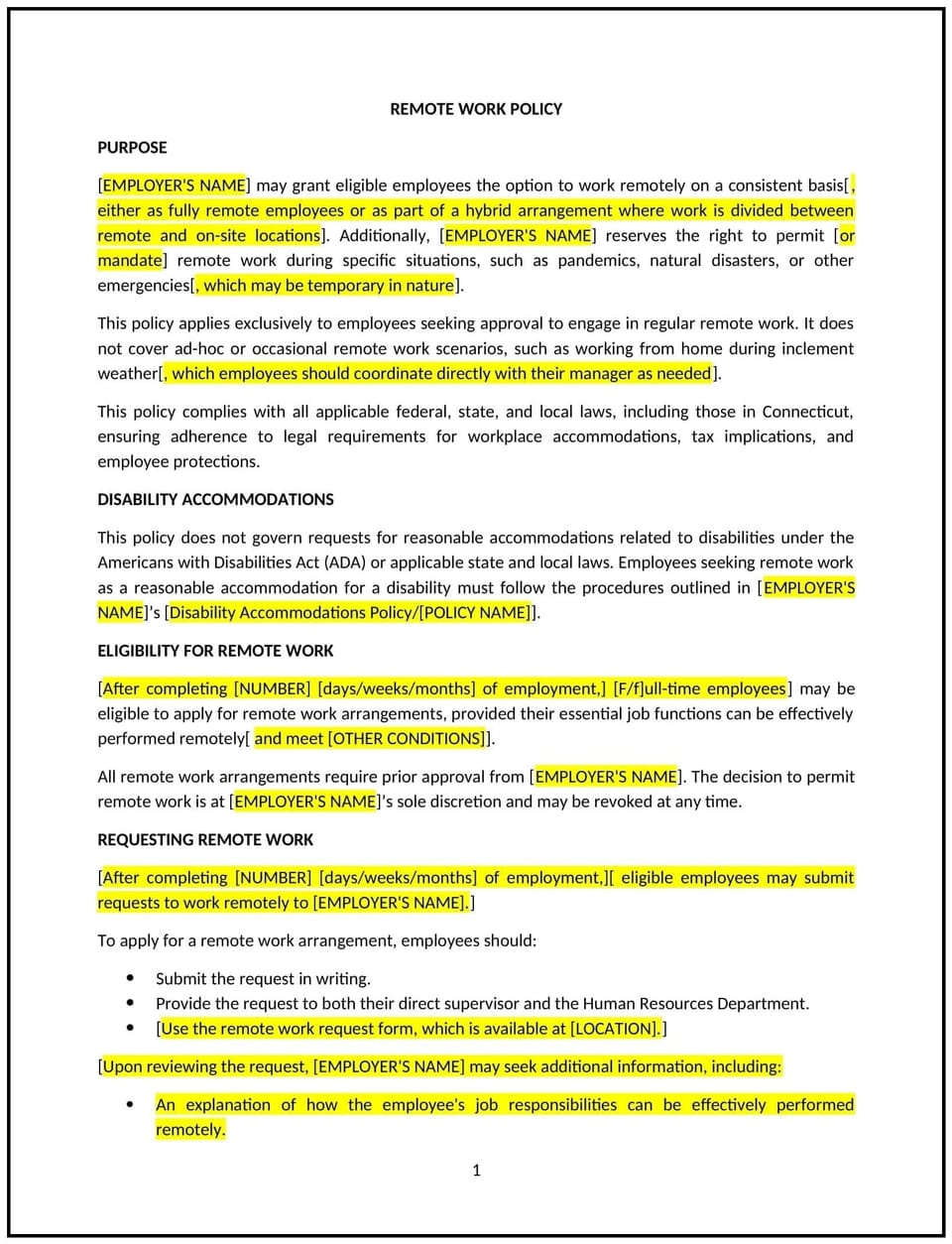Remote work policy (Connecticut): Free template

Remote work policy (Connecticut)
A remote work policy helps Connecticut businesses manage the logistics, expectations, and guidelines for employees who work from home or other off-site locations. This policy outlines the company's approach to remote work, including eligibility, expectations for performance, communication protocols, and the tools required to ensure productivity and security while working remotely.
By implementing this policy, businesses can offer employees flexibility, maintain operational efficiency, and protect company data, while ensuring a clear understanding of remote work expectations and requirements.
How to use this remote work policy (Connecticut)
- Define remote work eligibility: Specify which employees are eligible for remote work, including criteria such as job functions, performance, or length of employment.
- Set expectations for performance: Outline performance expectations for remote workers, including productivity levels, timelines, deliverables, and work quality, ensuring that remote work does not affect job performance.
- Establish communication guidelines: Set guidelines for how remote employees should communicate with their managers, teams, and clients, including response times, preferred communication tools (e.g., email, video conferencing), and availability during working hours.
- Provide necessary tools and resources: Specify the tools and resources the company will provide (such as laptops, software, or access to cloud systems) and any that employees are expected to supply (e.g., internet connection, home office setup).
- Ensure data security: Outline security protocols for remote work, including guidelines for accessing company data securely, using VPNs, password management, and maintaining privacy and confidentiality of company information.
- Address scheduling and availability: Define the working hours and flexibility available for remote workers, ensuring that employees maintain a clear schedule and are available during core business hours as needed.
- Outline remote work expenses: Specify whether the company will reimburse employees for any remote work-related expenses, such as internet costs, home office supplies, or utilities, and outline the process for submitting reimbursement requests.
- Monitor and evaluate remote work: Set guidelines for tracking remote work, such as using time-tracking software or regular check-ins with managers, to ensure employees remain engaged and productive.
Benefits of using this remote work policy (Connecticut)
This policy offers several benefits for Connecticut businesses:
- Increases flexibility: By allowing remote work, the company provides employees with greater work-life balance, which can lead to higher job satisfaction and retention.
- Boosts productivity: Clear guidelines for remote work help ensure that employees remain focused and productive, minimizing distractions and maintaining high performance.
- Supports work-life balance: The policy offers employees the flexibility to manage their personal and professional responsibilities more effectively, which can reduce stress and improve overall well-being.
- Reduces operational costs: Remote work can reduce the need for office space, utilities, and other overhead costs associated with maintaining a physical office.
- Ensures data security: By implementing security protocols, the policy helps protect company data and confidential information when employees work outside the office.
- Promotes employee retention: Offering remote work options can increase employee loyalty and retention by demonstrating a commitment to flexibility and modern work practices.
Tips for using this remote work policy (Connecticut)
- Communicate expectations clearly: Ensure that all employees understand the guidelines for remote work, including performance expectations, communication practices, and security protocols.
- Provide necessary tools and support: Ensure employees have the equipment and resources they need to work remotely, including any necessary software, access to company systems, and technical support.
- Foster strong communication: Establish regular check-ins with remote employees to maintain team cohesion, monitor progress, and address any challenges that arise from remote work.
- Monitor performance fairly: Ensure that remote employees are evaluated based on results and outcomes, not just the hours they work, to maintain fairness and accountability.
- Review periodically: Update the policy regularly to address changes in technology, work practices, or employee feedback to ensure it remains effective and relevant.
Q: How does this policy benefit my business?
A: The policy increases flexibility for employees, supports a better work-life balance, enhances productivity, and reduces operational costs, while ensuring clear expectations for remote work and protecting company data.
Q: Who is eligible for remote work?
A: Eligibility for remote work may depend on job function, performance, and business needs. The policy should outline which roles are eligible for remote work and any requirements employees must meet to be considered.
Q: What are the expectations for remote workers?
A: Remote workers are expected to maintain productivity, meet performance targets, and communicate regularly with their managers and teams. Clear guidelines should be set regarding working hours, availability, and deliverables.
Q: Will the company reimburse employees for remote work expenses?
A: The policy should specify which expenses, such as internet costs, office supplies, or home office setup, will be reimbursed and the process for submitting reimbursement requests.
Q: How often should this policy be reviewed?
A: The policy should be reviewed annually or whenever there are changes to Connecticut laws, business needs, or technology, ensuring that it remains effective, compliant, and relevant.
This article contains general legal information and does not contain legal advice. Cobrief is not a law firm or a substitute for an attorney or law firm. The law is complex and changes often. For legal advice, please ask a lawyer.


